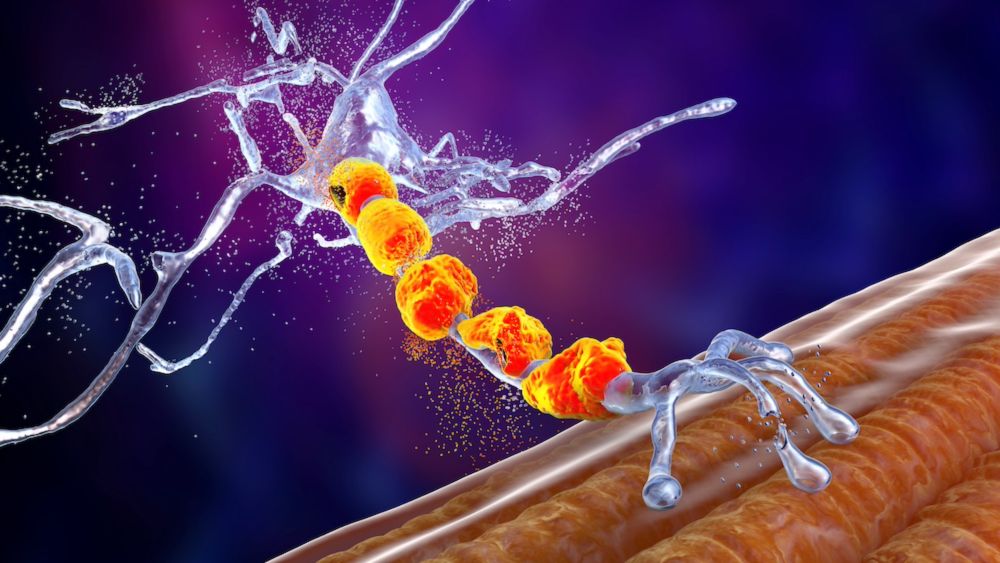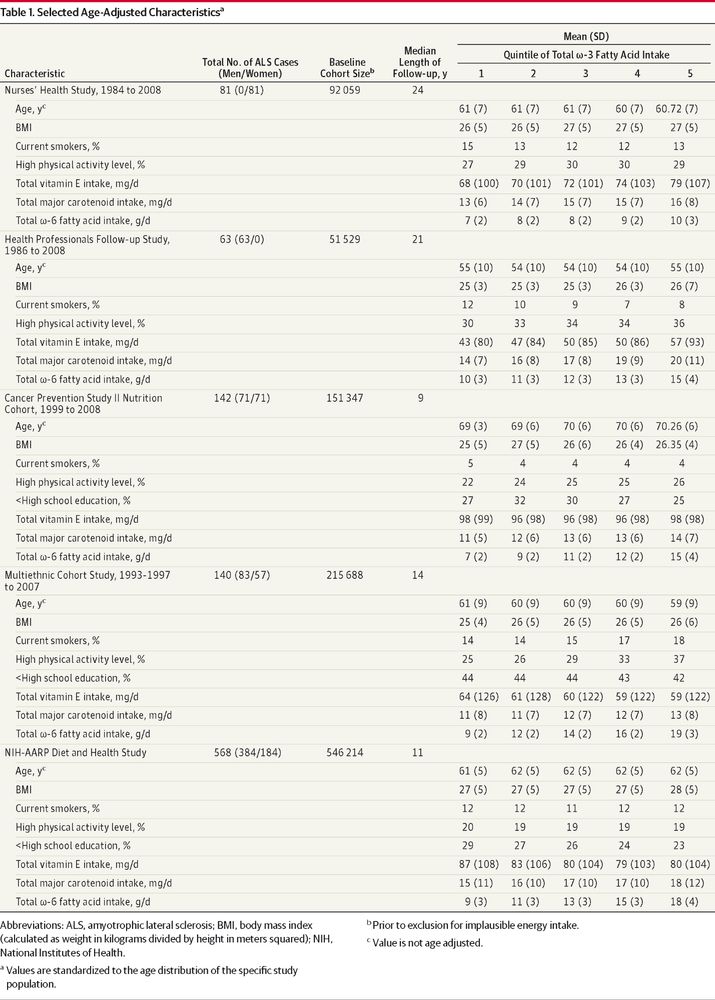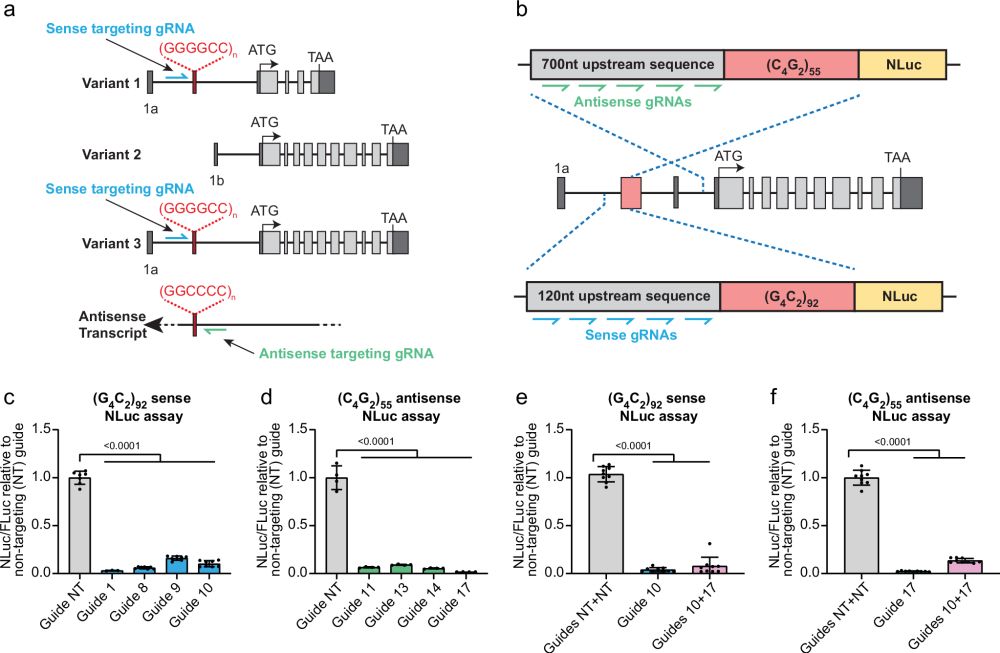
Research Fellow: Immune system and Cognitive function
Join the UKDRI at UCL in the Salih Lab to explore how glial-specific longevity genes affect ageing & Alzheimer’s using iPSC models, genomics & molecular biology
Join the UKDRI at UCL in the Salih Lab to explore how glial-specific longevity genes affect ageing and Alzheimer’s, using iPSC models, genomics, and molecular biology @ukdri.ac.uk @dervissalih1.bsky.social Closing date: 26th June
www.dementiaresearcher.nihr.ac.uk/job/research...
31.05.2025 21:38 — 👍 14 🔁 18 💬 0 📌 1
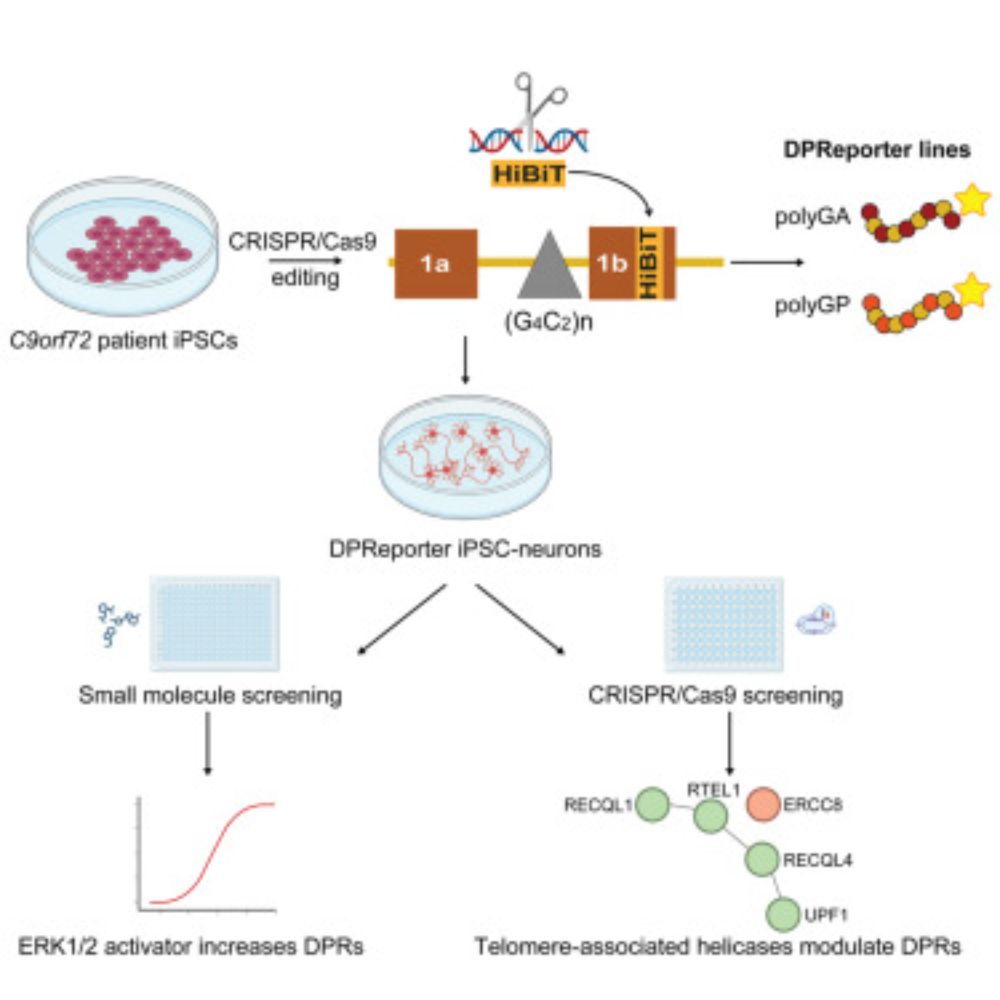
A multimodal screening platform for endogenous dipeptide repeat proteins in C9orf72 patient iPSC neurons
Repeat expansions in C9orf72 are the most common cause of amyotrophic lateral sclerosis and frontotemporal dementia. Repeat-associated non-AUG (RAN) t…
We tagged C9orf72 repeat dipeptides in patient iPSC-neurons and did genetic and small molecule screens with interesting results! Huge effort from many lab members @ukdri.ac.uk @uclqsion.bsky.social and @alzheimersresearchuk.org Drug Discovery Institute at UCL www.sciencedirect.com/science/arti...
28.05.2025 14:29 — 👍 6 🔁 5 💬 1 📌 0
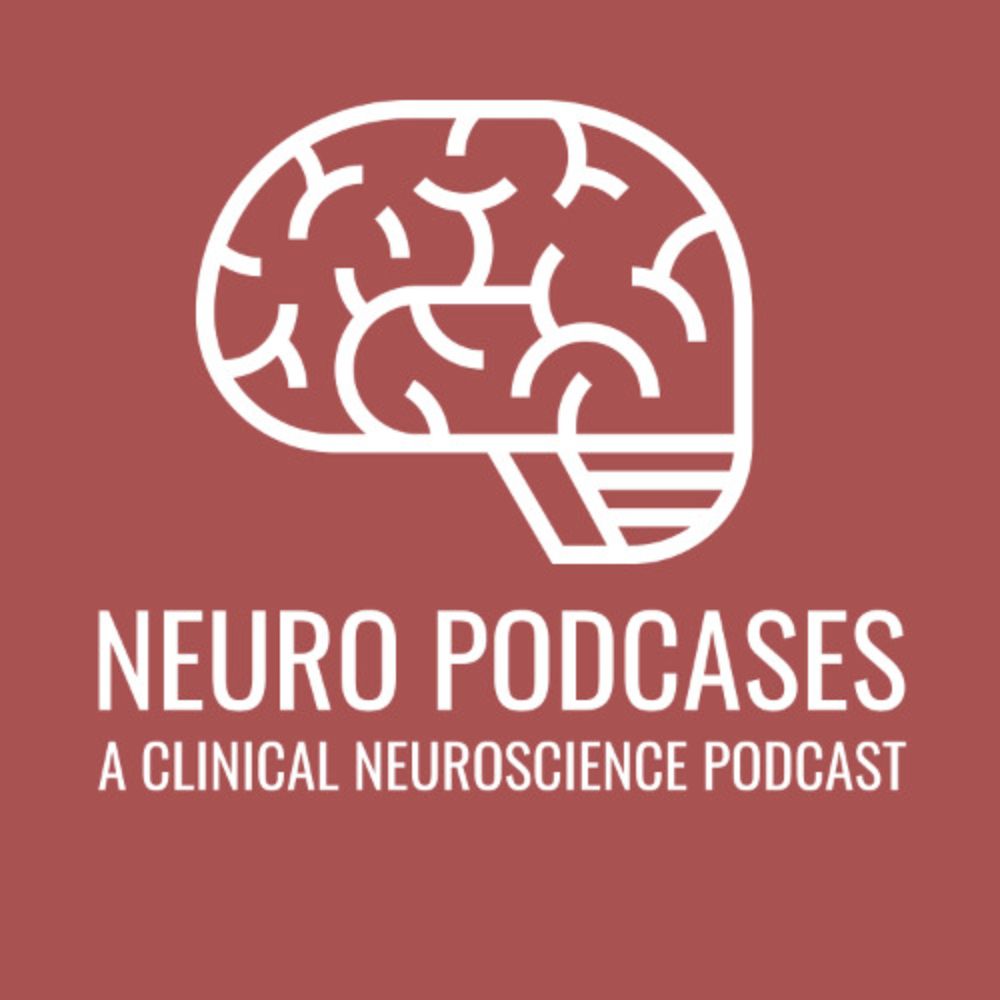
Genetic Causes of ALS/FTD with Prof. Isaacs
In this episode of our Neuroscience Research series, hosts Filippo Dall'Armellina and Michael Cearns welcome Professor Adrian Isaacs (UCL), who investigates the molecular and cellular mechanisms under
I recenty did a podcast about our work in the lab @ukdri.ac.uk @uclqsion.bsky.social to understand the mechanisms that cause FTD/ALS check it out here: SoundCloud on.soundcloud.com/xs6j9EcMbTRW...
- Apple Podcasts podcasts.apple.com/it/podcast/n...
- Spotify open.spotify.com/episode/7cnY...
17.04.2025 09:31 — 👍 12 🔁 8 💬 0 📌 0
We are still investigating the mechanisms of protection as it may be more beneficial to mimic the effects of PUFAs in the brain using other means
25.02.2025 13:31 — 👍 0 🔁 0 💬 0 📌 0
We next need to determine whether a specific PUFA (there are several) is able to provide benefit on its own and then take forward to a clinical trial
25.02.2025 13:31 — 👍 0 🔁 0 💬 1 📌 0
This suggests that delivery of PUFAs to neurons in the brain is needed for them to exert their protective effect
25.02.2025 13:31 — 👍 0 🔁 0 💬 1 📌 0
So we next expressed a fatty acid desaturase enzyme, which generate PUFAs, only in the brain cells of our C9orf72 ALS flies and this time the improvement was much more dramatic. This approach also increased the survival of human C9orf72 patient neurons
25.02.2025 13:31 — 👍 0 🔁 0 💬 1 📌 0
We next wanted to test if restoring PUFAs would be beneficial. We found that increasing PUFAs through the diet only modestly extended survival of our C9orf72 ALS fly model
25.02.2025 13:31 — 👍 0 🔁 0 💬 1 📌 0
We initially found a deficit in PUFAs in C9orf72 patient neurons and a fruit fly model by measuring ~1400 different lipids with Martin Giera and @rikvanderkant.bsky.social
25.02.2025 13:31 — 👍 0 🔁 0 💬 1 📌 0
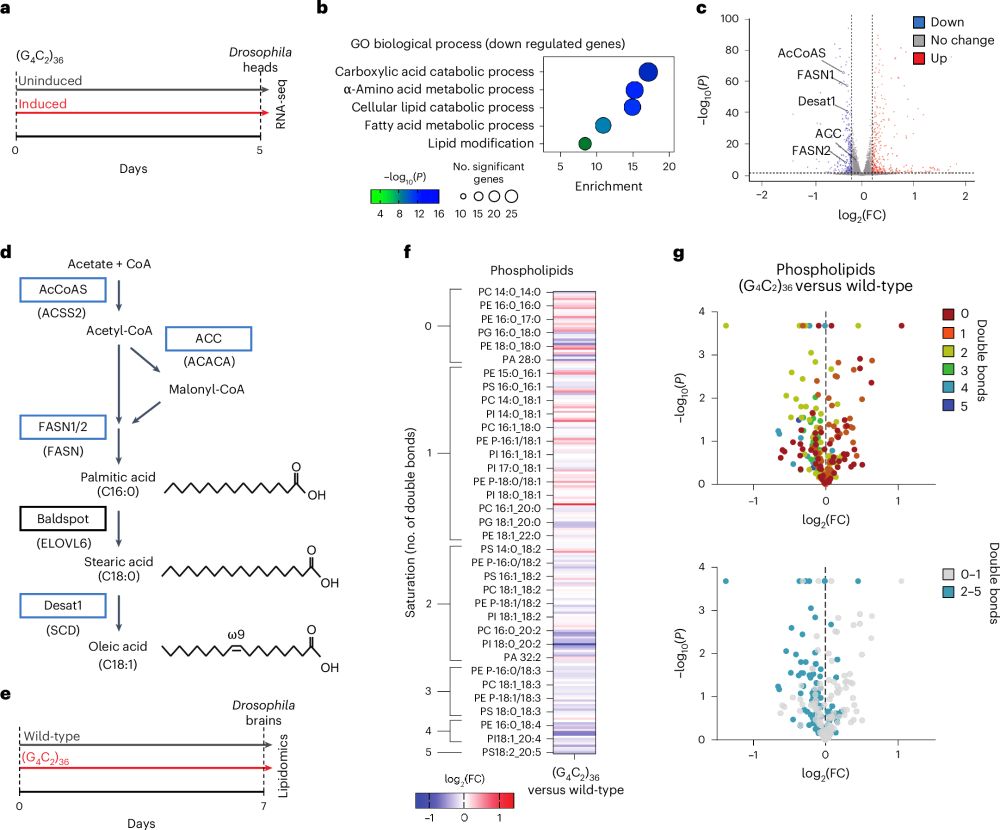
Neuronal polyunsaturated fatty acids are protective in ALS/FTD
Nature Neuroscience - Lipidomics revealed that neurons of patients with ALS/FTD have reduced levels of polyunsaturated fatty acid (PUFA)-containing phospholipids. Increasing neuronal PUFA levels...
Really excited this is out! We found polyunsaturated fatty acids (PUFAs) were beneficial in models of C9orf72 FTD/ALS and the greatest benefit occurred when increasing levels specifically within neurons @ukdri.ac.uk @uclqsion.bsky.social @ucl.ac.uk @cziscience.bsky.social
rdcu.be/ebbZf
25.02.2025 13:31 — 👍 47 🔁 24 💬 2 📌 3
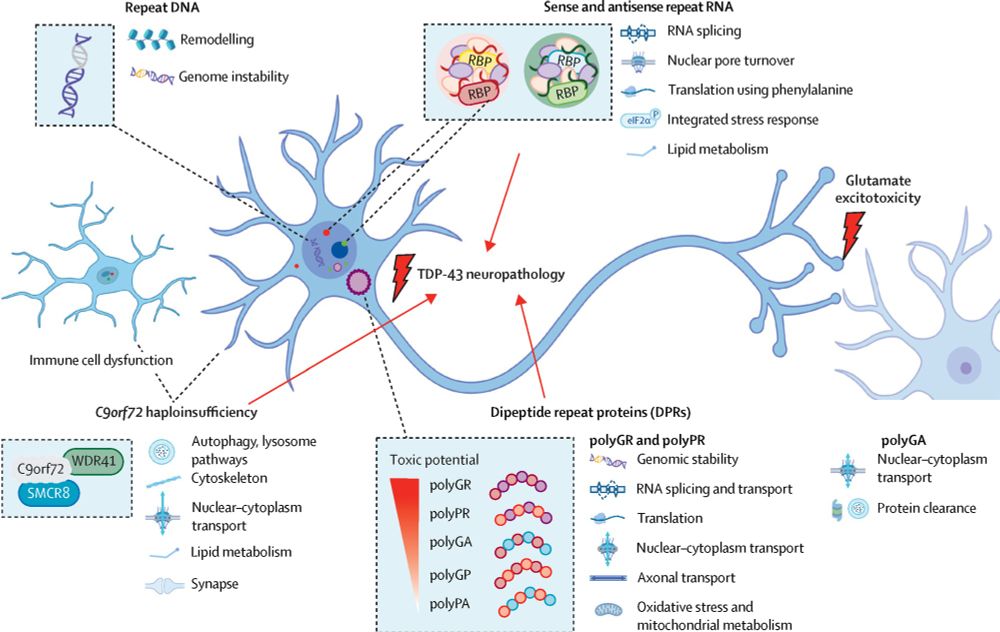
Check out our new review of C9orf72 ALS in @thelancetneuro.bsky.social with Sarah Mizielinska, Rosa Rademakers and others! Was fun to co-write but tough to collate such incredible progress into a one article: authors.elsevier.com/c/1ke765FFzL...
21.02.2025 09:56 — 👍 20 🔁 11 💬 0 📌 0
Neuroscientist and Associate Professor @DBT_inStem | EMBO Global Investigator | NERD Lab - Neurodevelopment and Disease lab- www.muralidharanlab.com
Neuroscience Professor at UKBonn&DZNE Bonn. Bridging the gap between brain and immunity with genomics 🏳️🌈🏴☠️🇨🇳🇹🇷🇫🇷🇳🇪🇩🇪
ORCID 0000-0001-6319-404X
Neuroscientist. Special interest in glial biology and role in neurological disorders. Love astrocytes. All views my own. She/her. 🏳️🌈
Principal Scientist at GSK • Still learning
Previously: JHU, UPenn, UNC-CH
🧬🦠🔬🧠🐈🌱
Assistant Professor at Baylor College of Medicine and Texas Children's Hospital. Houston, TX
Science: disorder, condensates, repeats, cell stress, neurodegeneration, drug discovery, synbio Non-science: art, fashion, cooking
www.boeynaemslab.org
Scientist interested in gene regulation by condensates in the 🧠 | Postdoc with Aaron Gitler @Stanford | PhD @UTSW studying IDR-IDR specificity in transcriptional condensates | 🇲🇽
Senior Lecturer & Group Leader @UKDRI @EdinburghUni, @The_MRC CDA Fellow | @USC & @Universite_Caen alumnus | Vascular, Imaging & Dementia 🧠 | Lab - @montagnelab
Researcher, all things Alzheimer, brain diseases and lipids
Associate Professor @YaleNeuro • co-Director of Graduate Studies @Yale_INP • @YaleRNA • RNA Neurobiology • Neurodegenerative disease • Immigrant • 🐶 dad • Alum @WhiteheadInst @HopkinsNeuro @PKU1898 🏳️🌈
We are a world-leading centre for neurological research within the UCL Faculty of Brain Sciences. www.ucl.ac.uk/brain-sciences/ion. Follow us also on LinkedIn.
Genetics and omics of neurodegeneration in Mount Sinai, NYC. www.humphreylab.org
𝘗𝘳𝘰𝘧𝘦𝘴𝘴𝘰𝘳 𝘰𝘧 𝘎𝘦𝘯𝘦 𝘛𝘩𝘦𝘳𝘢𝘱𝘺, 𝘜𝘊𝘓
𝘎𝘦𝘯𝘦𝘵𝘪𝘤 𝘵𝘩𝘦𝘳𝘢𝘱𝘪𝘦𝘴 𝘧𝘰𝘳 𝘤𝘩𝘪𝘭𝘥𝘩𝘰𝘰𝘥 𝘨𝘦𝘯𝘦𝘵𝘪𝘤 𝘥𝘪𝘴𝘦𝘢𝘴𝘦𝘴
𝘈𝘈𝘝, 𝘭𝘦𝘯𝘵𝘪, 𝘢𝘥𝘦𝘯𝘰, 𝘮𝘙𝘕𝘈
🧬🚲
Professor of Neurology and Complex Disease Genetics, King's College London. Co-Director UK MND Research Institute https://ukmndri.org #MND #ALS Specialist. Deputy Editor, Brain
UCL QS IoN Gene Therapy AAV 🧠
Psychiatrist and Neuroscientist at the UK Dementia Research Institute at UCL & Queen Square National Hospital for Neurology and Neurosurgery
Alzheimer's Society DRL Fellow at the University of Manchester. Glia & inflammation in FTD/MND. Interested in brains, social justice & mental health. She/her. Own views!
UCL Old Age Psychiatrist. Evidence-based treatments for dementia, psychosis, depression and anxiety in older people. Running for RCPsych President, see details here https://profrobhoward.com Still enjoying Twitter but here we all are.
I work in fluid biomarker research to find and measure protein markers of neurodegenerative diseases. I like being active even if my knees dont :-)


